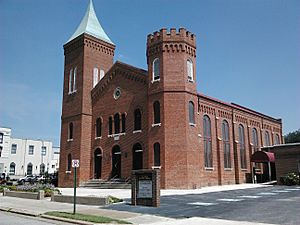Gillfield Baptist Church (Petersburg, Virginia) facts for kids
Quick facts for kids Gillfield Baptist Church |
|
|---|---|

Gillfield Baptist Church, Petersburg
|
|
| 37°13′25″N 77°24′28″W / 37.2235°N 77.4077°W | |
| Location | 209 Perry Street, Petersburg, Virginia |
| Country | United States |
| Denomination | Baptist |
| Website | www.gillfieldbaptistchurchpetersburg.org/ |
| Architecture | |
| Heritage designation | Virginia |
| Completed | 1797 |
Gillfield Baptist Church is a very old and important church in Petersburg, Virginia. It's one of the oldest Black Baptist churches in the entire country! It even has the oldest handwritten record book of any Black church. The church started in 1797.
Later, in 1957, a pastor named Wyatt Tee Walker helped start the Southern Christian Leadership Conference. He also led the church in the Civil Rights Movement in Petersburg. Gillfield Baptist Church still helps its community today.
Contents
A Look Back: Church History
How It All Began
The church first started in Prince Edward County, Virginia, in 1786. It was known as the Davenport Church. By 1797, it became its own church. It had both enslaved and free members.
In 1800, most of the Black members moved to Pocahontas Island. This island was a growing community for free Black people in Petersburg. The church then changed its name to Sandy Beach Baptist Church.
Finding a Home on Perry Street
In 1818, the church members bought land on Perry Street. This area was named after Erasmus Gill, a hero from the Revolutionary War. They built their first church building there. Over time, three more churches were built on the same spot. The church building you see today was built between 1874 and 1879.
In the early 1800s, Baptist churches were growing in Virginia. Many churches joined together in groups called associations. Gillfield Baptist Church joined the Portsmouth Baptist Association in 1810. At that time, it had 270 members.
Growing Strong and Facing Challenges
As more free Black people moved to Petersburg, Gillfield Baptist Church grew. By 1821, it was the largest church in its association. It had 441 members, which was more than twice as big as the next church! Even though free Black members were active, white pastors led the church in its early years. White leaders in the associations also tried to control Black churches.
In 1829, the Portsmouth Baptist Association tried to make Gillfield Baptist Church join with a white church. But the members of Gillfield Baptist Church said no and stayed at their own church. However, for a while, white members from another church had to represent them in meetings. This changed after the American Civil War and when slavery ended.
After a slave rebellion in 1831, a new law said that every Black church had to have a white minister. This was to try and control what was taught in the churches.
New Leadership and Freedom
After the Civil War, in 1865, the church chose Reverend Henry Williams as its first Black minister since 1831. He was the pastor from 1865 to 1900. He helped the church through big changes after the war. The church left the Portsmouth Association and joined a Black Baptist group. This helped them escape control by white leaders. This group later became the National Baptist Convention, USA.
Reverend Williams was also a leader in the community. He was elected to the City Council in Petersburg. He believed that Black teachers should teach Black students. He was active in politics into the 1880s.
The 20th Century and Civil Rights
Leading the Way with Wyatt Tee Walker
From 1953 to 1959, Reverend Wyatt Tee Walker led Gillfield Baptist Church. He was a close friend of Reverend Martin Luther King Jr.. Walker led efforts in Petersburg to end racial segregation, which meant keeping people of different races separate.
Walker helped start the Southern Christian Leadership Conference (SCLC) with Martin Luther King Jr. Gillfield Baptist Church was used for big meetings. People learned how to prepare for peaceful protests. Walker was arrested many times during the Civil Rights struggle. His first arrest was when he led people from the church into a public library that was only for white people.
He also started the Petersburg Improvement Association (PIA). This group helped plan how to fight for Civil Rights in Petersburg. By May 1960, the PIA had 3,000 members!
Walker left Gillfield Baptist in 1960 to work full-time for the SCLC. He helped the SCLC plan important Civil Rights actions, like the Birmingham campaign and the March on Washington.
Continuing the Fight and Making History
Reverend Grady W. Powell, Sr. became the next pastor in 1961. He led the church until he retired in 1997. He also took part in several Freedom Marches. When Reverend Powell started, he faced challenges like threats and a cross being burned in front of the church.
In 1970, Gillfield Baptist Church made history again. Under Reverend Powell's leadership, the church chose seven women to be deacons. This was a big step! Some of these women included Dr.Louise J. Thompson, Martha E. Moorefield, Thelma Mitchell, and Lula Allgood.
After Reverend Powell retired, Reverend Dr. George W. C. Lyons led the church. Gillfield Baptist Church is still an active and important part of the Petersburg community today.

